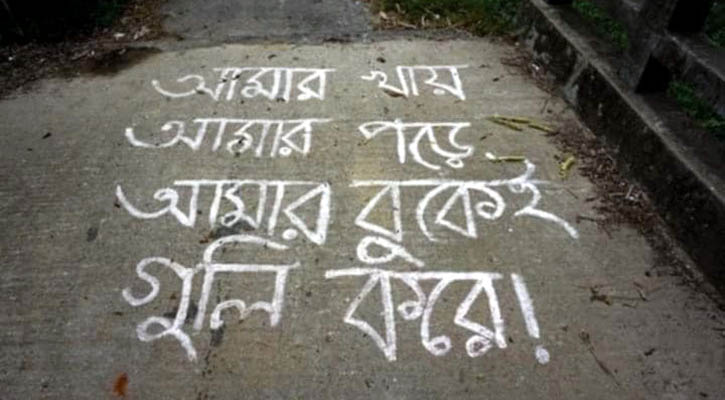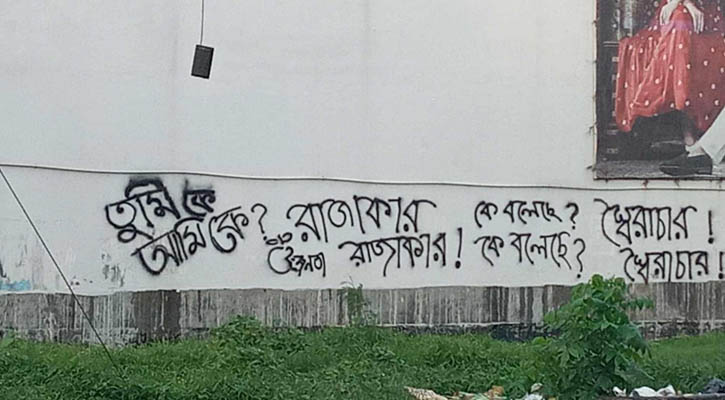“A storm rages inside my chest, I offer it—shoot!” — This was not just a slogan roared on the July 2024. It was the heartbeat of an entire movement that outstared Sheikh Hasina from power.
On July 1, 2024, when students took to the streets demanding reform in the government job quota system, few could have imagined that this anti-discrimination student movement would, in just 36 days, evolve into a movement demanding the fall of the government.
Within this movement, hundreds of slogans were born — each one a scream of the soul, a roar of a generation, a voice that shook the state. The language of the Movement of 24 was slogans. These slogans did not come from any central charter. They came from bloodied faces on the streets, from eyes heavy with grief, from hearts burdened with rage and rebellion. Just as rivers know no boundaries, this movement too followed no pre-written script. Each incident, each drop of blood, gave birth to new slogans.

After July 15, when the violence of the ruling Awami League government began to spread across the movement, the language of the protesters began to change. The blood-soaked reality took on a terrifying turn with the death of Abu Sayeed. On July 16, Abu Sayeed, a student of Begum Rokeya University in Rangpur, was shot dead by police. That moment marked the beginning of the “One-Point” demand—an unprecedented mass uprising calling for the government’s resignation.
It began as a movement for rightful demands. But it soon became the collective cry of a nation. The slogans of that time were not just words — they were weapons, they were the ballots of the movement. In a country where people cannot vote with freedom, they rise up and shout.
“Who am I, Who are you — Razakar! Razakar!” “Who said, who said — it’s a dictator! Dictator!” “One, two, three, four — Sheikh Hasina, leave your seat!” These were not just vocal outbursts. They were expressions of fury from millions.
When the movement hit its peak and Abu Sayeed’s blood dried on the streets, some of the most powerful slogans emerged — “They eat from me, then shoot me!” “Take your quota, return my brother!” “No dialogue between a gun and a burning heart!” “Give life through corpses or leave your throne!” These weren’t political slogans but raw emotions woven into the nation’s core. What began as an anti-discrimination movement revived old cries like “No place for discrimination in my golden Bengal!” “Raise your arms again like ’71!” “Break the hands that shoot!” and “Action, action, direct action!”—echoes of 1971 and 1990 voiced by a new generation.
Even school-going children and teenagers took up the language of protest — “Who has come, who has come? The police has come, the police has come!” “What are they doing? What are they doing? Licking the feet of the tyrant!” Such harsh words from their soft voices revealed how degraded the rulers of this nation have become.
As the movement spread across Dhaka and beyond, the imagery of rebellion appeared on placards, banners, and lines of poetry — “Look into these burning eyes — we will rise with this fire!” “Spring is coming, and we shall rise!” “Don’t give up, friend. Raise your voice!” “You understand Newton’s bombs, but not human pain!” The most heart-wrenching slogan — one that raises goosebumps — “A storm rages inside my chest, I offer it—shoot!” This single line became the poster of the movement.

The powerful voice of the youth proves that Bangladeshi nationalism has taken root deep within this generation. When the head of the fascist government called students the “children of collaborators,” and his allies told protesters to leave Bangladesh and go to Pakistan, the voices rose: “Every time you say ‘leave Bengal’ — is Bengal your ancestral property?”
Rickshaw pullers, small traders, and van drivers joining the 24 uprising was a unique moment. Their voices echoed slogans like “We won’t let my brother’s blood go in vain!” and “Light the fire, burn down Sheikh Hasina’s throne — together!” Even in Chattogram dialect, “Boudodin haio, ar no haie!” (“You’ve eaten enough, don’t eat more!”) went viral. These voices weren’t just on the streets—they ran through people’s veins.
During British rule, when “Vande Mataram” was banned, women in Barisal stopped tying their hair in protest. The slogans of the student and people’s uprising of 24 are the newest voice in that legacy.
Toward the end, echoes of history returned — “Inquilab Zindabad!” The bold 2018 slogan followed: “If you fear, you’re finished. If you resist, you are Bangladesh!” These became the movement’s backbone. Despite police gunfire, voices never stopped; they roared like a storm. These slogans signaled not just destruction, but rebirth—protest and unity.
Perhaps the slogans of the Movement of 24 will never find place in textbooks. But they will remain — painted on walls, written on placards, echoed from mouth to mouth — part of a living history. For history is not only written by politicians, but also by the student lying flat on the street, whispering one undying truth: “We have shed blood, and we will shed more if we must.”
Because this blood, these words, these slogans — they are the courage of a generation. The conscience of a nation. The promise of a new dawn.
MSK/











